The European Data Portal Thinkathon during the INSPIRE 2018 Conference
INSPIRE, Open Data, Copernicus ... Let's Get Together!
Between September 18 and September 20th, the INSPIRE 2018 conference took place in Antwerp Belgium. The motto of this year's edition was "INSPIRE users: Make it work together!"
Following this motto, the European Data Portal facilitated a thinkathon on Wednesday September 19th. The thinkathon - an interactive workshop format - created a new 'space' for the conference participants to 'make it work together'. The idea of a thinkathon is inspired by the hackathon format: It is a chance for people to come together in a thinking session for creative problem solving. The EDP team decided to 'challenge' the INSPIRE community to a brainstorming exercise - a "thinkathon". The EDP thinkathon dealt with the obstacles that the community is still encountering when working with INSPIRE, Copernicus and open government data - and how to overcome them.
The session started with an introduction to the methodology of the thinkathon, followed by a short series of lightning talks. In the talks, the vision and goals of INSPIRE, Copernicus and Open Data were presented. The talks emphasised the important role that data users play in the data value creation process and how civic engagement within the reuse communities needs to be enhanced to trigger and foster this process.
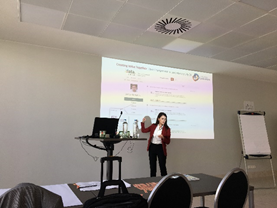
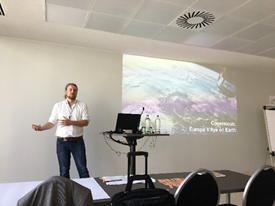
The talks were followed by a brainstorming session using the "speedboat" creativity technique. Participants were invited to gather around their field of interest (INSPIRE, Copernicus, open data) and think whether the set-out goals are being reached, and if not, what is holding the community back. During the group work, each group identified a series of "anchors' that hold the 'data speedboats' from running at full speed. In the second part of the thinkathon, the groups focused on prioritising the "anchors" according to their weight or urgency and explored ways in which these limitations can be overcome. The results were presented in plenum and discussed with the other participants.
Open Data is seen as an essential resource for economic growth, job creation and societal progress. that -- when used to its fullest extent, can yield benefits for businesses, citizens and society in general. Its potential is highlighted by the plethora of applications developed in numerous fields - from eHealth, food security, environment and resource efficiency to energy, intelligent transport systems and smart cities. Various studies were conducted to assess and capture this potential. Studies such as the Creating Value through Open Data Report elaborated by the European Data portal underline the benefits that Open Data has for the political, economic and societal development of countries.
Against this backdrop a pertinent question arises: What is holding the Open Data community back from fully capturing this potential? The Open Data session of the EDP hackathon focused on this question and the main challenges that Open Data reusers are still confronted with. The group emphasised the advancements made so far with regards to the legal, technical and semantical aspects of dealing with data, as well as the limitations that they still see affecting their 'daily work with data'. As main concerns, the participants highlighted the lack of alignment around common taxonomies and the legal aspects of licencing and attribution. While some participants stressed the hurdles that they faced due to the lack of inclusive governance structures, others focused on the lack of an 'experimental spirit' within the public sector as main point of concern. A culture of "trial & error" is still missing in many European countries, and data reusers are lacking enabling frameworks that allow them to engage in experiments together with the public sector. The entire group agreed however on the need to enable a better dialogue between all stakeholders and the urgency of creating cross-functional project teams. The group discussed how these aspects could be embedded into the modelling of new instruments to foster more effective cross-sectoral partnerships. Such collaboration would enable knowledge dissemination and best practices exchange across sectors, rather than strengthening knowledge dissemination within a sector. In addition to the initial agenda of the session, the recent launch of the Google dataset search service has in the Open Data ecosystem and its implications for national and pan-European Open Data platforms were discussed. All in all, a lively session that highlighted the richness that different vantage points brings to the table.
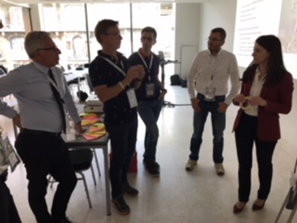
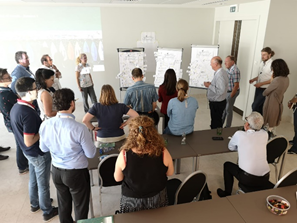
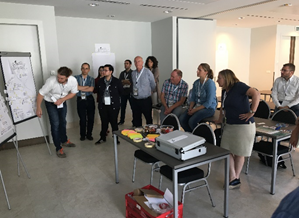
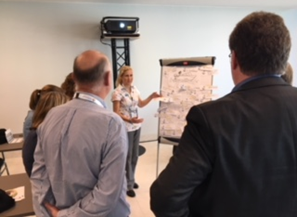
The purpose of INSPIRE is to support environmental protection policy by improving the availability and accessibility of relevant geodata. Geographic information is perceived to be the key for good governance and informed decision making, so it needs to be readily and transparently available. The group discussed possible approaches for "lifting the anchors" of the INSPIRE "speed boat". They started out by establishing that they felt INSPIRE is indeed a worthwhile effort. They are optimistic that it will eventually succeed - despite the many anchors/issues. One idea on how to tackle the identified problems was to "Stop the boat and start the discussion" (having taken our thinkathon's maritime metaphor to heart): There is a desire to reflect and possibly adjust the process before tackling the provision of the remaining data themes. It was clear that this group wants to be involved in helping INSPIRE succeed. Another possible solution the group discussed was that a "broker" is needed to combine the available datasets to produce harmonized datasets for Europe. These European datasets would be easier to use that the individual countries' datasets or services, thus showcasing the value of INSPIRE data. It is expected that during the act of combining the datasets feedback can be given to the individual member states and valuable lessons can be learned and shared. One other factor for slowing down progress was seen that the regulations, which have been compiled in the past by expert groups, are lacking flexibility for today's challenges and taking advantage of new technological developments. An idea to remedy this is to focus on some of the datasets from the data themes listed in Annex I of the INSPIRE Directive first: Using an agile approach for a step by step implementation with the opportunity to learn and improve the processes.
Copernicus is the most ambitious Earth observation programme headed by the European Commission and the European Space Agency (ESA). Copernicus' goal is to provide global, continuous, autonomous, high quality, and wide range Earth observation capacity, or - as ESA states "Copernicus will help shape the future of our planet for the benefit of all." The Copernicus group was most popular in terms of the number of participants who joined it. This came as a bit of a surprise as the conference's main topic was INSPIRE. It shows however, that the participants were eager to look beyond the end of their noses. Some of them are already involved in both INSPIRE and Copernicus. 'Bridging communities' was the main topic of discussion in this group. Exchange and collaboration were seen as the key to success: It was commonly agreed upon that INSPIRE should evolve to better fit the needs of Copernicus and that the INSPIRE community could profit from the input of the technical Earth Observation experts.
The main take-aways of the three sessions were:
- It was heartening to see how the participants want to be involved in making INSPIRE a success. The aspiration is to implement and provide the INSPIRE data themes in a way that is fit-for-purpose and efficient.
- Technical and semantical barriers are only one part of the 'bigger picture' and should be considered together with, and nor separate from the legal, organisational and governance aspects
- Despite the specificities of each community of practice, the barriers are similar and cut across the three data communities. Such obstacles can be alleviated more efficiently if frameworks are in place that foster collaboration the exchange across communities rather than within communities
- Value creation can be enhanced by enabling cross-functional competence teams of practitioners from the public, private, research and civil society sphere. At the same time, value creation through data can only be derived from the reuse. Triggering the reuse within the community should be a built-in element of the data publication process.
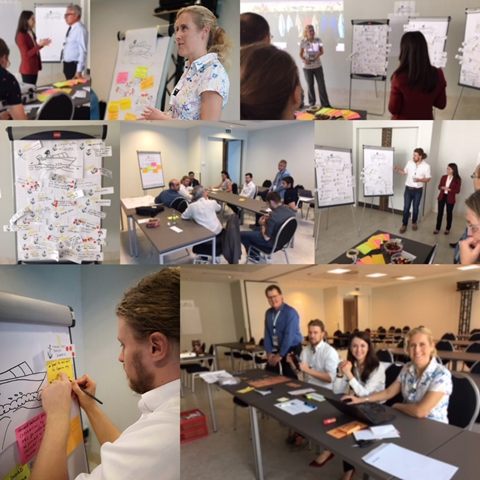
Overall, the EDP thinkathon proved to be a great exercise that triggered the audience to a creative and critical thinking session. With this format, the EDP provided the space for the conference participants stemming mainly from the INSPIRE field to look outside of their 'community bubble' and discuss the challenges encountered by their community of practice in regard to the experiences of other communities.
